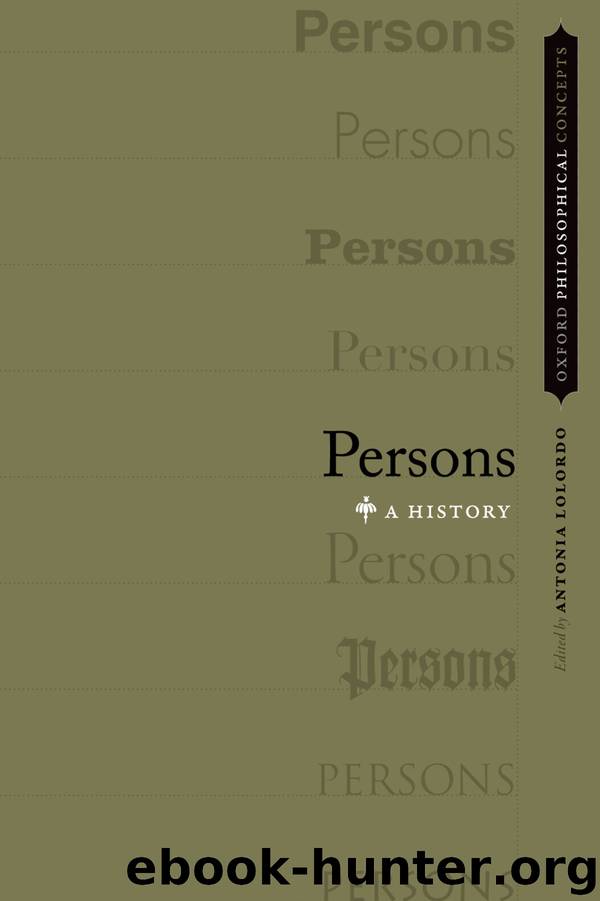Persons by Antonia LoLordo

Author:Antonia LoLordo
Language: eng
Format: epub
Publisher: Oxford University Press
Published: 2019-02-07T16:00:00+00:00
3.3 Personhood, Morality, and Immortality
Like both Locke and Leibniz, Wolff links personality to morality. This moral aspect is an essential part of the immortality-context in which Wolff examines personhood. According to Wolff, immortality requires not only that the soul be indestructible and retain its capacity for distinct perceptions but also that it continues to be a person or “conserves its state of personality.”91 For Wolff, in contrast to Locke and even Leibniz, the issue is not about the identity of the person after death, as distinct from the identity of the soul, as substance. The identity condition of immortality is secured sufficiently for Wolff by the nature of the soul as a simple, immaterial substance. Like Leibniz, however, Wolff insists that the indestructibility of an immaterial substance is necessary but not sufficient for immortality. Rather, for souls to be immortal they must continue to be persons or “conserve their state of personality,” that is, be able to be conscious of, and recognize, their identity with their premortem selves, an identity that is constituted independently of such consciousness and recognition.
Wolff accounts for personhood, or so it seems, in purely cognitive terms when he says that a person is a mental substance that is conscious of its diachronic identity. What does personhood, defined in this way, have to do with morality? In Psychologia rationalis Wolff simply adds to this definition the comment that one calls such a being also a “moral individual.”92 For Wolff, it seems, the connection of his account of personhood to morality is obvious. The moral nature of persons has to do precisely with their ability to recognize themselves as identical through time. Persons are beings who are responsible for their past actions because they are able to recognize their identity with the being that performed those actions in the past. It is not surprising, then, that Wolff introduces personhood also in the context of his account of natural law. “A human being is a moral person,” Wolff says there, “in so far as he is regarded as the subject of certain duties and of certain rights.”93 Wolff does not connect this comment explicitly to his account in terms of the consciousness of one’s diachronic identity, and he does not elaborate on the notion of personhood here. It is plain, however, that to be considered as the subject of rights and duties I must be able to be conscious of my own self as the author of certain thoughts and actions. Wolff does link personhood explicitly to moral issues in the context of his account of immortality, however. Wolff argues that only if the soul recognizes in its postmortem state that it is the same being who committed a crime in this life, can a reason be found why it should be punished for this crime in the afterlife. Otherwise the soul would not know why it has to suffer this punishment.94 This would mean in turn that one would not be able to recognize God’s wisdom in this punishment.
Download
This site does not store any files on its server. We only index and link to content provided by other sites. Please contact the content providers to delete copyright contents if any and email us, we'll remove relevant links or contents immediately.
| Anthropology | Archaeology |
| Philosophy | Politics & Government |
| Social Sciences | Sociology |
| Women's Studies |
Inward by Yung Pueblo(948)
The Good Book by A. C. Grayling(916)
A Meaning to Life by Michael Ruse(645)
Rings of Saturn by W. G. Sebald(630)
Letting Go: The Pathway of Surrender by David R. Hawkins(589)
Corporate Psychopathy by Katarina Fritzon & Nathan Brooks & Simon Croom(555)
The Jesus Delusion by Heinz-Werner Kubitza(547)
The Most Human Human: What Talking With Computers Teaches Us About What It Means to Be Alive by Brian Christian(540)
The Astrology of Love & Sex by Annabel Gat(537)
A Wonderful Life by Frank Martela PhD(522)
The Feeling of Life Itself by Christof Koch;(479)
The Most Human Human: What Talking with Computers Teaches Us About What It Means to Be Alive by Christian Brian(444)
Choiceless Awareness by J. Krishnamurti(414)
Love Unveiled by A. H. Almaas(408)
An End to Upside Down Living by Gober Mark(401)
A Burst of Conscious Light by Andrew Silverman(373)
The Ecological Thought by Timothy Morton(373)
Lin Yutang - the Importance of Living by Lin Yutang(372)
Design, Mediation, and the Posthuman by Dennis M. Weiss(364)
